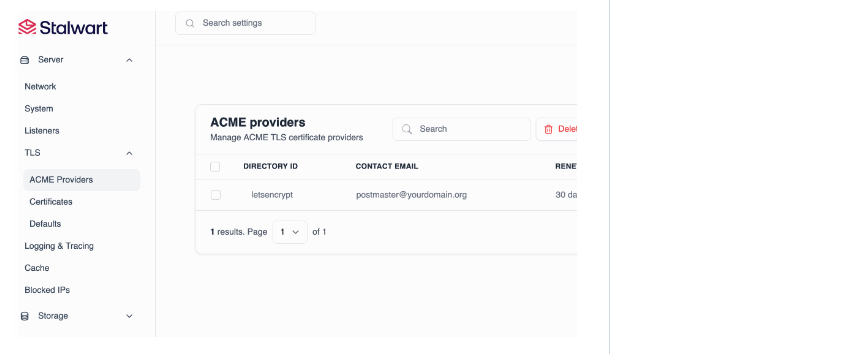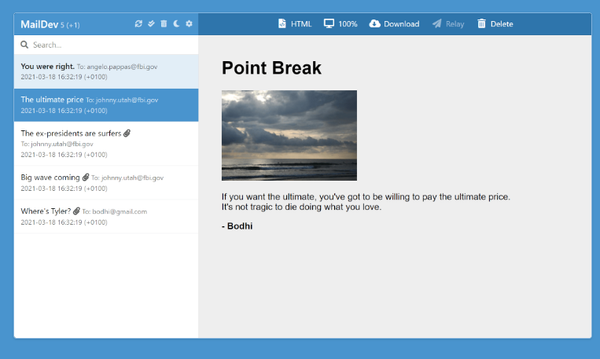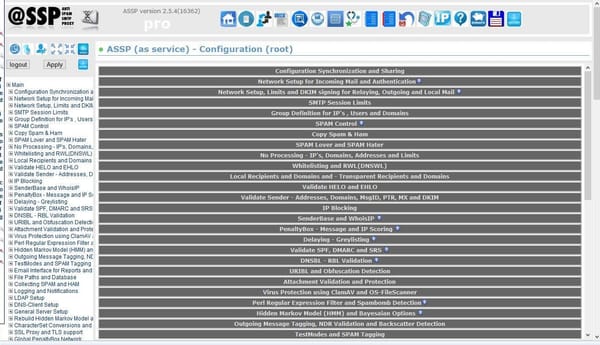Best Free 13 Mail Servers for Agencies and Enterprises in 2024
Table of Content
A mail server is a system that sends, receives, and stores emails. It uses standard email protocols like SMTP, IMAP, and POP3 to handle email communication between clients and servers.
Mail servers are used by individuals, businesses, and organizations to manage email communications. They are essential for sending and receiving emails, managing email accounts, and ensuring secure communication.
Many organizations opt for a secure email provider like Atomic Mail integrated with their mail servers to guarantee encrypted messaging, prevent unauthorized access, and comply with data protection regulations.
Who is Using It?
- Agencies: To manage client communications and internal emails.
- Enterprises: For corporate email solutions and secure communication.
- Companies: To handle business correspondence and team collaboration.
- Teams: For project communication and email management.
- Communities: To facilitate group communication and manage mailing lists.
Benefits
- Cost-Effective: Free and open-source mail servers eliminate licensing fees.
- Customizable: Open-source solutions can be tailored to specific needs.
- Secure: Many open-source mail servers offer robust security features.
- Scalable: Can be scaled to accommodate growing email demands.
- Community Support: Active communities provide support and updates.
- Privacy: Greater control over data and privacy compared to third-party services.
Exploring Open-Source Mail Servers: Features, Pros, and Cons
Open-source mail servers provide the flexibility, security, and transparency required for managing email communications effectively. Here, we explore some of the top open-source mail servers, highlighting their features, pros, and cons.
Choosing the right mail server is crucial for managing email communications efficiently and securely. The 13 free and open-source mail servers listed here offer robust features, scalability, and customization options, making them ideal for agencies, enterprises, companies, teams, and communities.
In the following list, is a unique collection that you will not find in any other website yet.
1. Mox
Mox is a modern full-featured open source secure mail server for low-maintenance self-hosted email.
Features:
- Quick and easy to start/maintain mail server, for your own domain(s).
- SMTP (with extensions) for receiving, submitting and delivering email.
- IMAP4 (with extensions) for giving email clients access to email.
- Webmail for reading/sending email from the browser.
- SPF/DKIM/DMARC for authenticating messages/delivery, also DMARC aggregate reports.
- Reputation tracking, learning (per user) host-, domain- and sender address-based reputation from (Non-)Junk email classification.
- Bayesian spam filtering that learns (per user) from (Non-)Junk email.
- Slowing down senders with no/low reputation or questionable email content (similar to greylisting). Rejected emails are stored in a mailbox called Rejects for a short period, helping with misclassified legitimate synchronous signup/login/transactional emails.
- Internationalized email, with unicode in email address usernames ("localparts"), and in domain names (IDNA).
- Automatic TLS with ACME, for use with Let's Encrypt and other CA's.
- DANE and MTA-STS for inbound and outbound delivery over SMTP with STARTTLS, including REQUIRETLS and with incoming/outgoing TLSRPT reporting.
- Web admin interface that helps you set up your domains, accounts and list aliases (instructions to create DNS records, configure SPF/DKIM/DMARC/TLSRPT/MTA-STS), for status information, and modifying the configuration file.
- Account autodiscovery (with SRV records, Microsoft-style, Thunderbird-style, and Apple device management profiles) for easy account setup (though client support is limited).
- Webserver with serving static files and forwarding requests (reverse proxy), so port 443 can also be used to serve websites.
- Simple HTTP/JSON API for sending transaction email and receiving delivery events and incoming messages (webapi and webhooks).
- Prometheus metrics and structured logging for operational insight.
- "mox localserve" subcommand for running mox locally for email-related testing/developing, including pedantic mode.
- Most non-server Go packages mox consists of are written to be reusable.
- Minimal configuration.
- Written in Go.
- Easy to install using Docker
Pros:
- Easy to set up and use.
- Lightweight and fast.
- Suitable for personal use.
Cons:
- Limited scalability.
- Basic features compared to more robust solutions.
GitHub: mjl-/mox
2. Postal
Postal is a complete and fully featured mail server for use by websites & web servers. Think Sendgrid, Mailgun or Postmark but open source and ready for you to run on your own servers.
Features:
- SMTP, API, and web interface.
- DKIM, SPF, and DMARC support.
- Built-in Webhook support
- Development mode
- Scalable
- Comes with a built-in spam and anti-virus protection
- Web-based management console.
Pros:
- Handles high volumes of email efficiently.
- Comprehensive security features.
- Detailed reporting and analytics.
- Secure by default
Cons:
- Requires more resources.
- Complex setup.
GitHub: postalserver/postal
3. Stalwart Mail Server
Stalwart Mail Server focuses on security and modern email standards.
Features:
- Supports SMTP, IMAP, POP3, JMAP.
- Built-in spam and phishing protection.
- Key Features
- JMAP Server: Full compliance with JMAP Core and JMAP Mail.
- IMAP4 and POP3 Server: Supports IMAP4rev2, IMAP4rev1, and POP3 with numerous extensions.
- SMTP Server: Includes DMARC, DKIM, SPF, ARC support, and strong transport security.
- Spam and Phishing Filter: Comprehensive filtering rules and statistical spam classifier.
- Flexible and Scalable Storage: Supports RocksDB, FoundationDB, PostgreSQL, mySQL, SQLite, S3-Compatible, Redis, and ElasticSearch.
- Clustering Support: Node autodiscovery and partition-tolerant failure detection.
- Full-Text Search: Available in 17 languages.
- Sieve Scripting: Support for all registered extensions.
- Email Aliases and Mailing Lists: Support for subaddressing and catch-all addresses.
- Web-Based Administration: Manage accounts, domains, groups, and mailing lists.
- Encryption at Rest: Supports S/MIME or OpenPGP.
- Two-Factor Authentication: Time-based One-Time Passwords (2FA-TOTP).
- Security Audited and Memory Safe: Enhanced security through Rust.\
- High configurability and extensibility.
Pros:
- Strong security features.
- Supports modern email protocols.
- Highly configurable.
Cons:
- Can be complex to configure.
- Requires regular updates and maintenance.
GitHub: stalwartlabs/mail-server

4. Mail-in-a-Box
Mail-in-a-Box helps individuals take back control of their email by defining a one-click, easy-to-deploy SMTP+everything else server: a mail server in a box.
Features:
- Automated Setup: Easy-to-follow setup process to create a mail server.
- Email Hosting: Complete email hosting for multiple domains.
- DNS Server: Built-in DNS server for managing domain names.
- Webmail Interface: User-friendly webmail interface for accessing emails.
- Spam Filtering: Integrated spam filtering to reduce unwanted emails.
- SSL/TLS Encryption: Automatic SSL/TLS certificate generation for secure communication.
- Backup Solutions: Automated backups of emails and server configuration.
- User Management: Interface for adding and managing users and aliases.
- DKIM and SPF: Support for DKIM and SPF for email authentication.
- Calendar and Contacts: Integrated calendar and contact management.
- Security Features: Regular security updates and configurations.
- Monitoring Tools: Tools to monitor server performance and health.
- Documentation: Comprehensive documentation for setup and troubleshooting.
Pros:
- Simple to deploy and manage.
- Comprehensive out-of-the-box features.
- Good documentation.
Cons:
- Less customizable.
- Not suitable for large-scale deployments.
GitHub: mail-in-a-box/mailinabox
5. Maddy Mail Server
Maddy Mail Server implements all functionality required to run a e-mail server. It can send messages via SMTP (works as MTA), accept messages via SMTP (works as MX) and store messages while providing access to them via IMAP. In addition to that it implements auxiliary protocols that are mandatory to keep email reasonably secure (DKIM, SPF, DMARC, DANE, MTA-STS).
It replaces Postfix, Dovecot, OpenDKIM, OpenSPF, OpenDMARC and more with one daemon with uniform configuration and minimal maintenance cost.
Note: IMAP storage is "beta". If you are looking for stable and feature-packed implementation you may want to use Dovecot instead. maddy still can handle message delivery business.
Features:
- Single binary deployment.
- SMTP, IMAP, and DMARC support.
- Flexible configuration.
Pros:
- Easy to deploy.
- Modern and modular design.
- Good performance.
Cons:
- Newer project, potentially less stable.
- Limited community support.
GitHub: foxcpp/maddy
6. WildDuck Mail Server
WildDuck is a modern email server solution developed by Nodemailer. It is designed to be fast, secure, and scalable, offering a full suite of email server functionalities. WildDuck supports various email protocols and provides robust features for managing and securing email communications.
Features:
- IMAP and POP3 Support: Full support for IMAP and POP3 protocols.
- SMTP Server: Robust SMTP server with support for authentication and encryption.
- Webmail Client: Built-in webmail client for accessing emails.
- Multi-Domain Support: Host emails for multiple domains.
- User Management: Comprehensive user management tools.
- Spam Filtering: Integrated spam filtering mechanisms.
- DKIM and SPF: Support for DKIM and SPF for email authentication.
- Encryption: TLS encryption for secure email transmission.
- Sieve Scripts: Support for Sieve scripts to manage email filtering and sorting.
- Backup and Restore: Tools for backing up and restoring email data.
- High Availability: Clustering support for high availability and scalability.
- Logging and Monitoring: Detailed logging and monitoring tools.
- APIs: RESTful APIs for integration and automation.
Pros:
- Highly scalable.
- Modern API-based management.
- Supports large-scale operations.
Cons:
- More complex to set up.
- Higher resource requirements.
GitHub: nodemailer/wildduck
7. Haraka
Haraka is a highly scalable node.js email server with a modular plugin architecture. Haraka can serve thousands of concurrent connections and deliver thousands of messages per second. Haraka and plugins are written in asynchronous JS and are very fast.
Haraka has very good spam protection (see plugins) and works well as a filtering MTA. It also works well as a MSA running on port 587 with auth and dkim_sign plugins enabled.
Haraka makes no attempt to be a mail store (like Exchange or Postfix/Exim/Qmail), a LDA, nor an IMAP server (like Dovecot or Courier). Haraka is typically used with such systems.
Haraka has a scalable outbound mail delivery engine built in. Mail marked as relaying (such as via an auth plugin) is automatically queued for outbound delivery.
Features:
- Asynchronous Processing: Designed for high performance with asynchronous I/O.
- Modular Architecture: Extensive plugin system for easy customization.
- SMTP Server: Full SMTP server functionality.
- Spam and Virus Filtering: Integrated spam and virus filtering capabilities.
- TLS Encryption: Supports TLS encryption for secure email transmission.
- DKIM and SPF: Built-in support for DKIM and SPF for email authentication.
- IPv6 Support: Full support for IPv6.
- Connection Throttling: Limits the number of connections to manage load.
- Blacklisting and Whitelisting: Support for IP and domain blacklisting/whitelisting.
- Logging and Monitoring: Detailed logging and monitoring features.
- Cluster Support: Can be run in a cluster for high availability.
- Extensible API: Rich API for extending and integrating Haraka with other systems.
- Quotas: Support for setting user and domain quotas.
- Developer-friendly
Pros:
- Highly extensible.
- Good performance.
- Active community.
Cons:
- Requires Node.js knowledge.
- Basic out-of-the-box features.
GitHub: haraka/Haraka
8. hardware/mailserver
hardware/mailserver is a full-featured mail server based on Docker.
Features:
- Postfix : a full-set smtp email server
- Dovecot : secure IMAP and POP3 email server
- Rspamd : anti-spam filter with SPF, DKIM, DMARC, ARC, ratelimit and greylisting capabilities
- Clamav : antivirus with automatic updates and third-party signature databases
- Zeyple : automatic GPG encryption of all your emails
- Sieve : email filtering (vacation auto-responder, auto-forward, etc...)
- Fetchmail : fetch emails from external IMAP/POP3 server into local mailbox
- Rainloop : web based email client
- Postfixadmin : web-based administration interface
- Unbound: recursive caching DNS resolver with DNSSEC support
- NSD : authoritative DNS server with DNSSEC support
- Træfik : modern HTTP reverse proxy
- SSL : let's encrypt with auto-renewal (SAN and wildcard certificates), custom and self-signed certificates support
- OpenLDAP : [BETA] ldap support available (only in
1.1-latestfor now) - Supporting multiple virtual domains over MySQL/PostgreSQL backend
- Integration tests with Travis CI
- Automated builds on DockerHub
Pros:
- Easy to deploy with Docker.
- Comprehensive features.
- Good for containerized environments.
Cons:
- Requires Docker knowledge.
- Can be resource-intensive.
GitHub: hardware/mailserver
9. Ad Hoc Email Server
Ad Hoc Email Server is, well, an ad hoc mail server. AHEM can be used for testing, where a large (or unknown) number of mailboxes are needed or to provide disposable emails for registering for services that might expose the email to spam; This project will provide both a RESTful API and web application for consuming the service.
Features:
- Minimalist design.
- Written in Python.
- Easy to configure.
Pros:
- Lightweight and simple.
- Easy to set up.
- Suitable for small projects.
- Setup with Docker in mins
Cons:
- Limited features.
- Not for high-volume email.
GitHub: o4oren/Ad-Hoc-Email-Server
10. PMail
PMail is a personal email server that pursues a minimal deployment process and extreme resource consumption. It runs on a single file and contains complete send/receive mail service and web-side mail management functions. Just a server , a domain name , a line of code , a minute of deployment time , you will be able to build a domain name mailbox of your own .
Features:
- Supports SMTP and IMAP.
- Simple configuration.
- Lightweight.
- Single file operation and easy deployment.
- The binary file is only 15MB and takes up less than 10M of memory during the run.
- Support dkim, spf checksum, Email Test score 10 points if correctly configured.
- Implementing the ACME protocol, the program will automatically obtain and update Let's Encrypt certificates.
Pros:
- Easy to set up.
- Suitable for personal use.
- Lightweight.
Cons:
- Basic features.
- Limited scalability.
GitHub: Jinnrry/PMail
11. Mailu
Mailu is a simple yet full-featured mail server as a set of Docker images. It is free software (both as in free beer and as in free speech), open to suggestions and external contributions. The project aims at providing people with an easily setup, easily maintained and full-featured mail server while not shipping proprietary software nor unrelated features often found in popular groupware.
Features:
- Standard email server, IMAP and IMAP+, SMTP and Submission with auto-configuration profiles for clients
- Advanced email features, aliases, domain aliases, custom routing, full-text search of email attachments
- Web access, multiple Webmails and administration interface
- User features, aliases, auto-reply, auto-forward, fetched accounts, managesieve
- Admin features, global admins, announcements, per-domain delegation, quotas
- Security, enforced TLS, DANE, MTA-STS, Letsencrypt!, outgoing DKIM, anti-virus scanner, Snuffleupagus, block malicious attachments
- Antispam, auto-learn, greylisting, DMARC and SPF, anti-spoofing
- Freedom, all FOSS components, no tracker included
Pros:
- Easy deployment with Docker.
- Rich feature set.
- Active community.
Cons:
- Requires Docker knowledge.
- Can be resource-intensive.
Website: mailu.io
GitHub: Mailu/Mailu
12. Salmon
Salmon is a pure Python mail server designed to create robust and complex mail applications in the style of modern web frameworks. Salmon is designed to sit behind a traditional mail server in the same way a web application sits behind Apache or Nginx.
It has all the features of a web application stack (templates, routing, handlers, state machine) and plays well with other libraries, such as Django and SQLAlchemy.
Features:
- Modern IMAP Server: High-performance IMAP server.
- Asynchronous Processing: Utilizes asynchronous I/O for improved performance.
- Modular Design: Easily extensible with plugins.
- Flexible Authentication: Supports various authentication mechanisms.
- TLS Encryption: Ensures secure email communication.
- Efficient Storage: Optimized for efficient storage management.
- Full IMAP Support: Complies with IMAP standards and extensions.
- Logging and Monitoring: Comprehensive logging and monitoring capabilities.
- Multi-Domain Support: Hosts emails for multiple domains.
- Scalability: Designed to scale with growing email demands.
- Can run as a non-root user
Pros:
- Easy to set up.
- Lightweight.
- Good for small projects.
Cons:
- Limited features.
- Not suitable for high-volume use.
GitHub: moggers87/salmon
13. SmtpServer
SmtpServer is a simple, but highly functional SMTP server implementation. Written entirely in C# it takes full advantage of the .NET TPL to achieve maximum performance.
Features:
- Written in C#.
- Easy integration with .NET applications.
- Simple API.
Pros:
- Easy to use with .NET.
- Lightweight.
- Suitable for developers.
Cons:
- Limited to .NET ecosystem.
- Basic features.
GitHub: cosullivan/SmtpServer
Conclusion
Choosing the right open-source mail server depends on your specific needs and technical expertise. For personal use, Mox and PMail offer simple and lightweight solutions. For more robust and scalable options, Postal, Stalwart Mail Server, and WildDuck are excellent choices.
Tools like Mail-in-a-Box and Mailu provide user-friendly interfaces for easier management, while Haraka and Maddy offer modern and modular architectures.
These mail servers are recommended for their reliability, community support, and features that cater to the needs of various organizations, from small teams to large enterprises.
Explore these options to find the best fit for your email server needs.
Related













